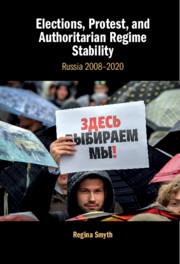Book contents
- Elections, Protest, and Authoritarian Regime Stability
- Elections, Protest, and Authoritarian Regime Stability
- Copyright page
- Dedication
- Contents
- Figures and Tables
- Acknowledgments
- 1 Elections, Protest, and Regime Dynamics
- 2 Winning Elections
- 3 The Long Game
- 4 The Unexpected Power of Weak Opposition
- 5 The Vote Protest
- 6 The Polls Close and Two Movements Emerge
- 7 Protest and Rally Dynamics
- 8 The Perpetual Campaign
- 9 2018–2020
- Book part
- References
- Index
1 - Elections, Protest, and Regime Dynamics
Published online by Cambridge University Press: 16 October 2020
- Elections, Protest, and Authoritarian Regime Stability
- Elections, Protest, and Authoritarian Regime Stability
- Copyright page
- Dedication
- Contents
- Figures and Tables
- Acknowledgments
- 1 Elections, Protest, and Regime Dynamics
- 2 Winning Elections
- 3 The Long Game
- 4 The Unexpected Power of Weak Opposition
- 5 The Vote Protest
- 6 The Polls Close and Two Movements Emerge
- 7 Protest and Rally Dynamics
- 8 The Perpetual Campaign
- 9 2018–2020
- Book part
- References
- Index
Summary
This chapter lays the foundation for the study of the role of elections in non-democratic regimes. Using VDem data, the analysis in the chapter shows that while stability is the most common response to electoral autocracies, elections can produce change in a liberalizing or autocratizing direction. This introductory chapter describes this process of voter mobilization in Russia in 2011–2012 and in terms of the existing literature on autocratic stability. It creates the foundational framework for the empirical study that brings together important studies of autocratic elections, hybrid regime stability, and post-election protest. This foundation supports the central argument of the book: when controlled elections reveal information about the lack of regime accountability, voters protest at the ballot box and on the streets. Societal mobilization provides opportunities for opposition growth and forces regimes to respond to maintain stability. The final section of the chapter outlines the plan of the book and summarizes the arguments in each chapter.
- Type
- Chapter
- Information
- Elections, Protest, and Authoritarian Regime StabilityRussia 2008–2020, pp. 1 - 24Publisher: Cambridge University PressPrint publication year: 2020
- 1
- Cited by

